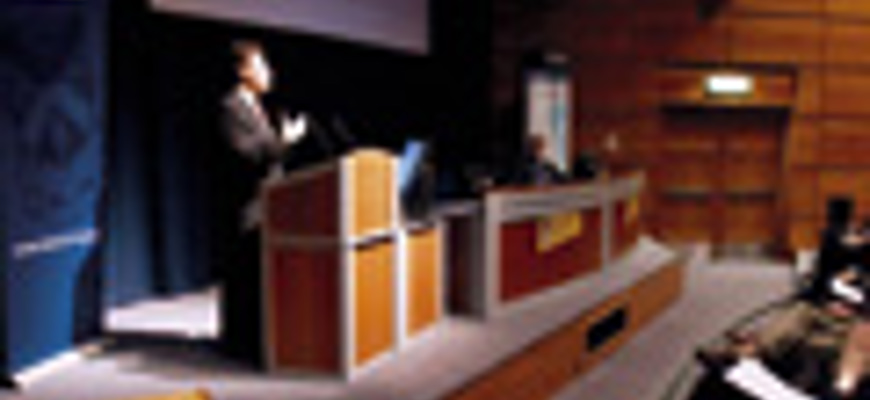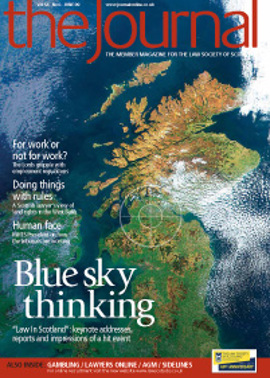Platform for success?

Those who recall Richard Susskind’s keynote address to last year’s annual conference of the Society will have heard some echoes in his presentation to this year’s “Law in Scotland” event. But the economic background is completely different, and that, as fellow presenter Jonathan Edwards emphasised, brings the day much closer when solicitors will have to pay heed to what the internet can bring or risk going out of business.
Opening the Saturday morning session with an address simply entitled “The future of the profession”, Susskind reinforced his message (Journal, June 2008, 12) that whereas lawyers often react to his predictions with a (usually wrong) “That’s not going to happen”, or “I hope I can retire before all this engulfs me”, with a little leadership the profession can in fact define the shape of things to come.
Clients demanding more for less will be the trend for years to come; solicitors are increasingly going to see recycling of their knowledge, expertise and work, and if they don’t do it, their clients will; and “The best way to predict the future is to invent it”. All messages heard from Susskind before, but delivered with more urgency a year later.
Catalyst for change
What has changed? The economy, for a start. As Edwards pointed out, the near 50% growth in the profession over the last 15 years means that something has to change with the sudden shrinking of the legal services market. At the same time, with financial services having also collapsed, an “army of commoditisers” – those who develop a product to a point where brands no longer have any distinguishing features, and consumers buy on price alone – are searching for new markets, and sooner or later will settle on legal services.
The downturn, he argued, is simply the catalyst for the breaking of the model for traditional, charged by the hour, added-value legal services.
Meanwhile online networking has reached new heights. Facebook, “the next generation of email”, is in Susskind’s view the most powerful way of networking and keeping in contact, and has now been joined by “twittering” – already adopted by one legal firm as a means of providing updates from its property department. ”What’s more likely, an online pet or an online lawyer?” he asked, pointing to the site www.sermo.com where doctors in the USA can share observations, findings and research as well as job opportunities and the like. People go online to make price comparisons, order goods, and even settle disputes – e-bay provides that service too.
Vacuum to fill
So who is thinking about the future? Massive amounts of regulation are coming through in various fields of compliance, and others than lawyers are taking up the opportunities to provide advice, Susskind claimed. Unlike some fields, he added in the panel session that followed his address, it won’t happen with someone starting up in their garage: we need some “unlikely champions” – people who if they take the initiative, will cause others to think, if they’re taking it seriously, there must be something in it. And there is a latent demand: with an estimated 1,000,000 unresolved cases in England & Wales, we need to find new ways to make justice available to the great majority. Susskind’s own prediction is that ultimately the voluntary sector “will play a huge role”.
Much of what he said was reflected in Edwards’ presentation later the same morning, entitled “Survival of the fittest! Why the internet can be the saviour of the Scottish legal profession”.
Like Susskind, Edwards predicts a move to a collaborative rather than an adversarial approach, and a division between knowledge – the province of the expert solicitor – and rules, which can be applied by unqualified staff. What it needs, as he outlined recently in the Journal (April 2009, 48) is a Scotland-wide electronic platform through which the profession can extend its services into new areas. Sponsored by the Society and collectively owned by the profession, it would provide the forum for collaboratively sharing work, increasing the collective total of services offered to the public, and also for reducing the cost of carrying out transactional or case work involving more than one party.
Added understanding
It need not, Edwards added, be a hugely sophisticated system, to begin with at any rate: what matters is not how much technology you have but how you use it. Nor will it necessarily lead to cheaper fees (the market will determine the level here), but it will enable the profession to be more profitable. It will also be empowering of the client, in that it will enable them to “pull” information when they want it. The model is the solicitors’ property centres, which also involve competing solicitors co-operating to create a bigger collective cake.
It goes without saying that in order to practise in this manner a solicitor will need to have access to internet and email. Most, though not all, already do. So is the profession up to the challenge? Here Edwards expressed some pessimism. His survey, trailered in his April article, attracted less than 50 responses, which in his view demonstrates the need for the Society to be proactive in bringing the new model about. (Interestingly, a separate survey of local authority legal departments revealed almost 80% providing services to the public via the internet, not counting email.)
“To enter the internet age”, Edwards concluded, “the profession needs to change the way it sees itself, understand clients’ preferences on the delivery of services and the transformative economics of the ideas expressed in this presentation.”
Something is happening
Is the Society taking up the challenge? Some developments are in hand. Its involvement in Registers of Scotland’s ARTL project led to two members of the executive, Gordon Brewster and James Ness, being co-opted to the CCBE (Council of European Bars) technology committee, which is promoting the development of an agreed standard for a CCBE digital ID card including a secure qualified digital signature.
Related to this work is the development, with EU grant funding, of a secure email and digital document exchange platform known as PenalNet (www.penalnet.eu). Although the grant is intended to support a platform for use in cross-border criminal cases, the technology would be capable of supporting any form of communication. The Society has worked closely with those involved in that project, in particular the Spanish who have deployed over 90,000 CCBE-compliant digital signatures to their members (and are already using a variant as a secure communication platform within Spain), and who along with Romania and Italy are currently piloting the PenalNet platform. The EU hopes that PenalNet will be available to all participating bars in June 2010.
“The Society would wish to ensure the profession in Scotland could benefit from this technology if it is proven successful and can be made available at a reasonable cost”, James Ness told the Journal. “We continue to monitor the project with interest.”
Jonathan Edwards agrees that this work may well be a basis for the sort of platform he would like to see. “It would depend on a number of features but it has to be a worthwhile starting point.”
Edwards reports a good response to his talk at conference and underlines the parallels with Richard Susskind’s analysis. “Certainly both were following a similar theme of unavoidable substantial change.”
In this issue
- Spanish executry law – cross border issues
- The Scottish Parliament’s Emergency Bill procedure
- One year on
- Unequal before the law (1)
- Ian Smart's inauguration speech
- Your new First XI
- Dangerous loophole
- Unlocking the rule of law
- Our guiding light
- A hit for the conference
- Of chairs, trains and escalators
- Unequal before the law
- Matters of the mind
- New game, new rules
- Advance on all fronts
- Making openness work
- The First XI
- Society parleys with the OFT
- Professional Practice Committee
- Committees: the unsung heroes
- Find a client?
- Platform for success?
- Ask Ash
- Constant foe
- Killer question
- A time to be inventive
- Deep pockets required?
- Win some, lose some
- New client - new problems
- Website review
- Book reviews
- A business view






